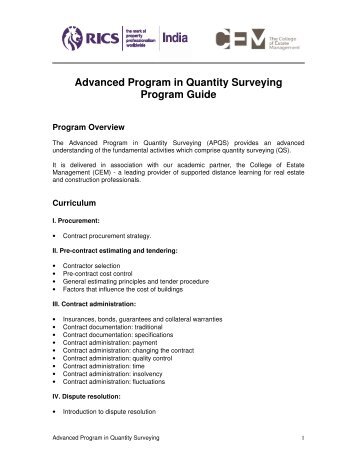Oct 20, 2018 A Quantity Surveyor with mid-career experience which includes employees with 5 to 10 years of experience can expect to earn an average total compensation of ₤37,000 based on 455 salaries. Quantity Surveyors, project managers or anybody interested in the construction industry and built environment will find really useful information on this large web site.
Entry requirements You'll need a degree or professional qualification accredited by the. This can be a quantity surveying degree or a postgraduate conversion course from any degree.
Quantity Surveyor Estimating Guide


Useful subjects are construction, structural or civil engineering, mathematics, geography, economics or land studies. You could also start work as a junior or trainee quantity surveyor, a surveying technician or surveying assistant, then study to become a quantity surveyor. You could also get into this job with an. You’ll need to be a to become a fully qualified chartered surveyor. For this you’ll need to complete the. Skills required You'll need:.
What Do Quantity Surveyors Do
budgeting skills. excellent IT and maths skills. organisational and planning skills. negotiation and leadership skills 3. What you'll do You could work in the public sector for a local authority, housing association or government department. You could also work in the private sector for a building contractor, property company, civil engineering or architecture firm. Your day-to-day tasks may include:.

finding out a client’s needs and assessing if their plans are feasible. working out quantities and costs of materials, time and labour for tenders. negotiating contracts and work schedules.
advising on legal matters, including risks and disputes. monitoring sub-contractors and stages of construction. writing regular reports on costs and preparing accounts for payment. keeping up to date with construction methods and materials. following health and safety and building regulations 4.
Salary Starter: £18,000 to £25,000 Experienced: £25,000 to £50,000 Highly Experienced: £50,000 to £80,000 (senior) These figures are a guide. Work power and machines study guide. Working hours, patterns and environment You'll usually work Monday to Friday, 8.30am to 5pm. You may work evenings or weekends. Hours may be longer if you work on-site as a contractor. You'll spend time in an office and visiting building sites. You’ll usually need a full driving licence. Career path and progression With experience, you could become a senior quantity surveyor or move into senior project management, supply chain management, consultancy work or self-employment.
You could specialise in areas like planning, risk assessment or contract disputes. Another option is to move into lecturing at a university or college. Related careers You may be interested in:. Last updated: 02 April 2018.